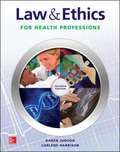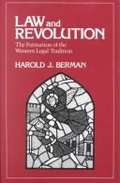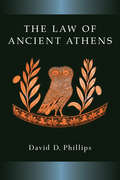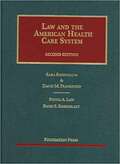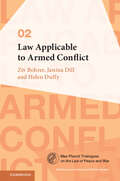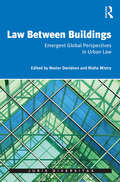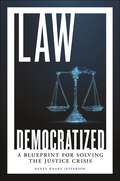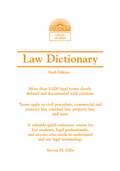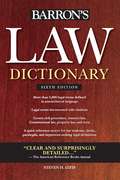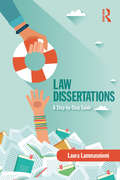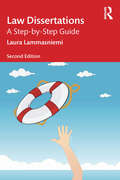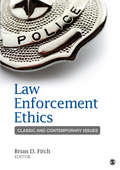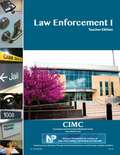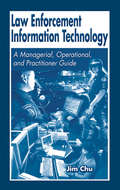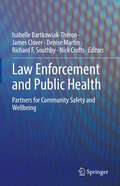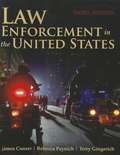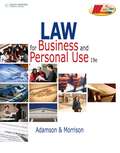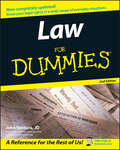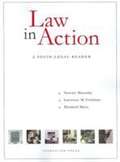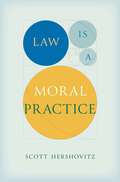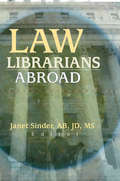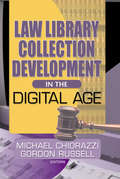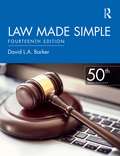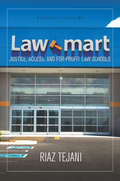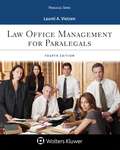- Table View
- List View
Law And Ethics: For The Health Professions (7th Edition)
by Karen Judson Carlene HarrisonLaw and Ethics for the Health Care Professions illustrates the numerous legal and ethical issues that health care professionals face every day. The topics are derived from real-life experiences and dilemmas from a variety of health care practitioners. Through the use of Learning Outcomes, Key Terms, Ethics Issues, Chapter Reviews, Case Studies, Internet Activities, Court Cases, and Video Vignettes, students hear from health care practitioners in various locations throughout the United States as they encounter legal and ethical problems and situations. Students will practice critical thinking skills to decide how to resolve the real-life situations or theoretical scenarios, determine why the court made a particular ruling and decide how the issues are relevant to the health care profession they will practice.
Law And Revolution: The Formation Of The Western Legal Tradition
by Harold BermanThe roots of modern Western legal institutions and concepts go back nine centuries to the Papal Revolution, when the Western church established its political and legal unity and its independence from emperors, kings, and feudal lords. Out of this upheaval came the Western idea of integrated legal systems consciously developed over generations and centuries. Harold J. Berman describes the main features of these systems of law, including the canon law of the church, the royal law of the major kingdoms, the urban law of the newly emerging cities, feudal law, manorial law, and mercantile law. In the coexistence and competition of these systems he finds an important source of the Western belief in the supremacy of law. Written simply and dramatically, carrying a wealth of detail for the scholar but also a fascinating story for the layman, the book grapples with wideranging questions of our heritage and our future. One of its main themes is the interaction between the Western belief in legal evolution and the periodic outbreak of apocalyptic revolutionary upheavals. Berman challenges conventional nationalist approaches to legal history, which have neglected the common foundations of all Western legal systems. He also questions conventional social theory, which has paid insufficient attention to the origin of modem Western legal systems and has therefore misjudged the nature of the crisis of the legal tradition in the twentieth century.
Law And Society In The Ancient World: Law Of Ancient Athens
by David PhillipsThe Law of Ancient Athens contains the principal literary and epigraphical sources, in English, for Athenian law in the Archaic and Classical periods, from the first known historical trial (late seventh century) to the fall of the democracy in 322 BCE. This accessible and important volume is designed for teachers, students, and general readers interested in the ancient Greek world, the history of law, and the history of democracy, an Athenian invention during this period. Offering a comprehensive treatment of Athenian law, it assumes no prior knowledge of the subject and is organized in user-friendly fashion, progressing from the person to the family to property and obligations to the gods and to the state. David D. Phillips has translated all sources into English, and he has added significant introductory and explanatory material. Topics covered in the book include homicide and wounding; theft; marriage, children, and inheritance; citizenship; contracts and commerce; impiety; treason and other offenses against the state; and sexual offenses including rape and prostitution. The volume’s unique feature is its presentation of the actual primary sources for Athenian laws, with many key or disputed terms rendered in transliterated Greek. The translated sources, together with the topical introductions, notes, and references, will facilitate both research in the field and the teaching of increasingly popular courses on Athenian law and law in the ancient world.
Law And The American Health Care System, 2d (University Casebook Ser.)
by Sara Rosenbaum David Frankford Sylvia Law Rand RosenblattLaw and the American Health Care System (University Casebook Series) 2nd Edition
Law Applicable to Armed Conflict (Max Planck Trialogues #2)
by Janina Dill Helen Duffy Ziv BohrerWhich law applies to armed conflict? This book investigates the applicability of international humanitarian law and international human rights law to armed conflict situations. The issue is examined by three scholars whose professional, theoretical, and methodological backgrounds and outlooks differ greatly. These multiple perspectives expose the political factors and intellectual styles that influence scholarly approaches and legal answers, and the unique trialogical format encourages its participants to decenter their perspectives. By focussing on the authors' divergence and disagreement, a richer understanding of the law applicable to armed conflict is achieved. The book, firstly, provides a detailed study of the law applicable to armed conflict situations. Secondly, it explores the regimes' interrelation and the legal techniques for their coordination and prevention of potential norm conflicts. Thirdly, the book moves beyond the positive analysis of the law and probes the normative principles that guide the interpretation, application and development of law.
Law Between Buildings: Emergent Global Perspectives in Urban Law (Juris Diversitas)
by Nestor Davidson Nisha MistryThe rich field of urban law has thus far lacked a holistic and concerted scholarly focus on comparative and global perspectives. This work offers new inroads into the global and comparative streams within urban law by presenting emerging frameworks and approaches to topics ranging from urban housing and land use to legal informality and consumer financial protection. The volume brings together a group of international urban legal scholars to highlight emergent global, interdisciplinary perspectives within the field of urban law, particularly as they have import for comparative legal analysis. The book presents a timely addition to the literature given the urgent legal issues that continue to surface in an age of rapid urbanization and globalization.
Law Democratized: A Blueprint for Solving the Justice Crisis
by Renee Knake JeffersonA practical plan for providing legal help to all, regardless of resourcesMillions of people in the United States face legal problems without lawyers to help them. Why? How do we educate and inform the public about the law so they can understand when the services of a lawyer are necessary or desirable? When can individuals solve legal problems on their own or with the assistance of a specialist without a traditional law degree? In short, how do we democratize the law?Law Democratized offers a blueprint to increase legal help for everyone, regardless of their ability to pay. Building on more than a decade of research into innovation in legal services, the book advances a series of recommendations inspired by success stories from around the globe. Renee Knake Jefferson outlines different paths pursued by bar associations, courts, entrepreneurs, law schools, nonprofits, and others, evaluating the promise and pitfalls of each. She analyzes regulatory reforms employed in other nations, along with emerging efforts in a handful of US states.If the rule of law is the bedrock that American democracy rests upon, then the justice transformed system must be open and user-friendly to all. Law Democratized makes a compelling argument for transforming the American legal landscape through engaged citizenship, ethical innovation, expanded education, and regulatory reform, in order to democratize law and make legal help more accessible.
Law Dictionary, (Mass Market) 6th Ed.: Mass Market Edition
by Steven H. GifisA Simon & Schuster eBook. Simon & Schuster has a great book for every reader.
Law Dictionary, (Trade) 6th Ed: Mass Market Edition
by Steven H. GifisA Simon & Schuster eBook. Simon & Schuster has a great book for every reader.
Law Dissertations: A Step-by-Step Guide
by Laura LammasniemiLaw Dissertations: A Step-by-Step Guide provides you with all the guidance and information you need to complete and succeed in your LLB, LLM or law-related dissertation. Written in a simple, clear format and with plenty of tools to help you to put the theory into practice, Laura Lammasniemi will show you how to make writing your law dissertation easy, without compromising intellectual rigour. As well as explaining the process of research and outlining the various legal methodologies, the book also provides practical, step-by-step guidance on how to formulate a proposal, research plan, and literature review. Unlike other law research skills books, it includes a section on empirical research methodology and ethics for the benefit of students who are studying for a law-related degree. Packed full of exercises, worked examples and tools for self-evaluation, this book is sure to become your essential guide, supporting you on every step of your journey in writing your law dissertation.
Law Dissertations: A Step-by-Step Guide
by Laura LammasniemiLaw Dissertations: A Step-by-Step Guide provides law students with all the guidance and information they need to complete and succeed in their LLB, LLM or law-related dissertation. Written in an accessible, clear format and with plenty of tools to help put the theory into practice, Laura Lammasniemi will show students how to make writing a law dissertation easy, without compromising intellectual rigour. The primary aim of this book is to tackle the issues that cause anxiety to law students undertaking a dissertation so that they can focus on the research that you find exciting. As well as explaining the process of research and outlining the various legal research approaches, the book also provides practical, step-by-step guidance on how to formulate a proposal, research plan, and literature review. The second edition expands guidance to LLM and Masters students, and provides up-to-date guidance on how to complete your project using both online resources and remotely. Unlike other law research skills books, Law Dissertations: A Step-by-Step Guide includes a section on empirical research methodology and ethics for the benefit of students who are studying for a Masters in law. Packed full of exercises, worked examples, and tools for self-evaluation, this book is sure to become an essential guide for law students, supporting them on every step of their dissertation journey.
Law Enforcement Ethics: Classic and Contemporary Issues
by Brian D. FitchThis unique collection of essays covers many of the important facets of law enforcement ethics, including the selection, training, and supervision of officers. Editor Brian D. Fitch brings together the works of a diverse task force with a vested interested in reducing officer misconduct—including law enforcement scholars, educators, and practitioners from a variety of disciplines—to present a comprehensive look at this critical subject that is gaining more attention in agencies and in the media today. The text covers topics on the roles of culture, environment, social learning, policy, and reward systems as they pertain to law enforcement ethics, as well as the ethics of force, interrogations, marginality, and racial profiling. This volume also covers several unique aspects of ethics, such as the role of Post-Traumatic Stress Disorder in misconduct (PTSD), cheating during law enforcement promotional practices, off-duty misconduct, and best practices in developing countries.
Law Enforcement I Student Edition
by Oklahoma Department of Career Technology EducationOur Law Enforcement I curriculum was developed in cooperation with the National Partnership for Careers in Law, Public Safety, Corrections and Security. It provides an estimated 178 hours of instruction for secondary and post-secondary students interested in pursuing a law enforcement career, and is aligned with an end-of-instruction assessment produced by the CareerTech Testing Center.
Law Enforcement Information Technology: A Managerial, Operational, and Practitioner Guide
by James ChuARE YOU PREPARED FOR THE LAW ENFORCEMENT IT REVOLUTION? Law enforcement agencies that are laggards in Information Technology (IT) will soon, if not already, be considered mismanaged. Whether you are in an operational position, or you are a police officer who aspires to a higher rank, you must be aware of how IT can help you perform your job and hel
Law Enforcement and Public Health: Partners for Community Safety and Wellbeing
by Denise Martin Isabelle Bartkowiak-Théron James Clover Richard F. Southby Nick CroftsThe expanding remit of policing as a fundamental part of the public health continuum is increasingly acknowledged on the international scene. Similarly the growing role of health professionals as brokers of public safety means that the need for scholarly resources for developing knowledge and broadening theoretical positioning and questioning is becoming urgent and crucial. The fields of law enforcement and public health are beginning to understand the inextricable links between public safety and public health and the need to shift policies and practices towards more integrated practices. This book comes as a first, an utterly timely scholarly collection that brings together the views of multidisciplinary commentators on a wide range of issues and disciplines within the law enforcement and public health (LEPH) arena. The book addresses the more conceptual aspects of the relationship as well as more applied fields of collaboration, and the authors describe and analyze a range of service delivery examples taken from real-life instances of partnerships in action. Among the topics covered:Defund, Dismantle or Define Law Enforcement, Public Health, and Vulnerability Law Enforcement and Mental Health: The Missing Middle The Challenges of Sustaining Partnerships and the Diversification of Cultures Using Public Health Concepts and Metrics to Guide Policing Strategy and Practice Policing PandemicsLaw Enforcement and Public Health: Partners for Community Safety and Wellbeing is essential reading for a wide array of professions and areas of expertise in the intersectoral field of LEPH. It is an indispensable resource for public health and law enforcement specialists (practitioners, educators, scholars, and researchers) and training programs across the world, as well as individuals interested in developing their knowledge and capacity to respond to complex LEPH issues in the field, including public prosecutors, coroners, and the judiciary. The text also can be used for undergraduate and postgraduate university policing, criminology, sociology, psychology, social work, public health, and medicine programs.
Law Enforcement in the United States
by James A. Conser Rebecca Paynich Terry E. GingerichThis book is an ideal introduction to law enforcement and goes beyond discussions of local policing to examine how forces like technology, privatization, and the threat of terrorism are affecting law enforcement on local, state, and national levels. Readers will learn how these diverse and unpredictable forces are shaping the future of law enforcement in the United States, and will come away with the ability to think critically about law enforcement issues. New Material added to the revised and updated Third Edition:-"Stay Current" boxes throughout the text offer references and key search terms for further internet research-Updated figures, tables, charts and other statistical and descriptive information-A New chapter on socialization, advancement, and professionalism, including ethics and misconduct-A New chapter with emphasis on law enforcement's role in national security, homeland security, and protecting private assets-A separate chapter on "Policing Strategies, Tactics, and Daily Operations"-An expanded and updated chapter on management issues-Updated and expanded appendices
Law For Business And Personal Use
by John Adamson Amanda MorrisonExplore the foundations of business law as well as the application of legal concepts to everyday life. LAW FOR BUSINESS AND PERSONAL USE, 19E, combines strong content and interactive technology with consistent, proven instruction to maintain student interest and support active learning. Coverage includes contracts, criminal law, environmental law, family law, and consumer protection. With more than 1,000 cases, LAW FOR BUSINESS AND PERSONAL USE, 19E, offers plenty of opportunities for case analysis and research.
Law For Dummies, 2nd Edition
by John VenturaGet answers to your legal questions -- in plain English! Find out how to protect your family, your money, your job, and your rights If you're like most people, you probably don't know much about your legal rights and responsibilities -- until you run smack-dab into a messy legal problem. Now revised and updated, this friendly guide helps you get a handle on a wide range of everyday legal issues, decipher legal mumbo-jumbo -- and come out on top. Discover how to: Protect your child support rights Arm yourself against identity theft Clean up your credit and improve your credit score Hire the right attorney for your needs Draw up wills and living wills
Law In Action: A Socio-Legal Reader
by Lawrence M. Friedman Elizabeth Mertz Stewart MacaulayThis text is designed for law students and for courses in legal studies programs. The reader deals in depth with the relationship between the legal system and its surrounding society, including such classic issues as the social sources of law and the impact of legal rules and institutions on society. Other chapters examine the role of judges and lawyers in the system and how culture and historical tradition help mold the legal systems of various societies. The book contains six chapters, each containing classic and contemporary readings on these subjects, with extensive notes and questions to guide the student.
Law Is a Moral Practice
by Scott HershovitzA powerful argument for the essential role of morality in law, getting at the heart of key debates in public life.What is law? And how does it relate to morality? It’s common to think that law and morality are different ways of regulating our lives. But Scott Hershovitz says that this is a mistake: law is a part of our moral lives. It’s a tool we use to adjust our moral relationships. The legal claims we advance in court, Hershovitz argues, are moral claims. And our legal conflicts are moral conflicts.Law Is a Moral Practice supplies fresh answers to fundamental questions about the nature of law and helps us better appreciate why we disagree about law so deeply. Reviving a neglected tradition of legal thought most famously associated with Ronald Dworkin, Hershovitz engages with important legal and political controversies of our time, including recent debates about constitutional interpretation and the obligations of citizens and officials to obey the law.Leavened by entertaining personal stories, guided by curiosity rather than ideology, moving beyond entrenched dichotomies like the opposition between positivism and natural law, Law Is a Moral Practice is a thought-provoking investigation of the philosophical issues behind real-world legal debates.
Law Librarians Abroad
by Janet SinderGain an international perspective on law library practices and precedents!Because law librarianship is an increasingly international field, working and learning abroad can enrich you culturally and professionally. Whether you visit for a few weeks or move halfway across the world for a year or more, Law Librarians Abroad gives you information about exchange programs, tips for adapting to a different culture, and ideas on how to make the most of a life-changing experience. Law Librarians Abroad explains a number of types of work you may find in other countries: US Information Agency or UN library programs informal visits formal exchange programs teaching clients or colleagues to use new technologies temporary library positions combining personal research with library workSome of the contributors to this exciting volume visited completely different cultures. Their new experiences included seeing snow for the first time and scuba diving the Great Barrier Reef. One went home to Korea after 25 years in the United States.Law Librarians Abroad offers practical suggestions as well: pitfalls and pleasures of living in a foreign country how to set up an exchange or plan a visiting librarian program how to build friendships with librarians abroad before you goIn countries from Canada to Zimbabwe, on every continent except Antarctica, the authors of Law Librarians Abroad combined work and travel--and you can too!
Law Library Collection Development in the Digital Age
by Gordon Russell Michael ChiorazziWhile the digital revolution has touched every aspect of law librarianship, perhaps nowhere has the effect been more profound than in the area of collection development. Many of the materials law libraries traditionally collected in print form are now available in electronic format. Digital technology has affected the way we select, order, and process legal materials. The World Wide Web has created an explosion of both commercial and private online publishing. The cost of electronic publishing has caused many traditional law book publishers to sell their companies rather than invest in the needed technologies to compete in the 21st century. Small publishers and book jobbers have been forced to reinvent themselves. The amount of legal information available and its costs continue to soar. Law Library Collection Development in the Digital Age deals with these and other issues related to law library collection development. Chapters range from the theoretical to the practical. Inspired by Penny Hazleton’s seminal paper “How Much of Your Print Collection is Really on Lexis or Westlaw?” the editors and chapter authors of Law Library Collection Development in the Digital Age endeavor to expand on professor Hazleton&’s work, with examinations of: the role of law libraries in strategic planning for distance learning Web mirror sites trust vs. antitrust issues access vs. ownership issues how law libraries deal with electronic court records, dockets, and filings the growth of e-journals as they relate to legal publishing how the Hein Greenslips and Blackwell North America’s Bookservice cover legal materials past, present, and future roles of specialized book jobbers and more! Anyone interested in law librarianship or the information industry will find this book informative and useful. Make it a part of your professional collection today.
Law Made Simple
by David L.A. BarkerThis fourteenth edition of Law Made Simple marks the fiftieth year of the publication for one of the best-selling UK Law books. It is the perfect introduction to the English Legal System, and combines an overview of both the legislation and case law relating to all the foundation subjects, including Contract, Torts, Land, Trusts, Criminal, Public and EU. Fully updated, this book acts as a clear and concise guide for students studying law at any level, and takes into account developments across the curriculum. It is suitable for students studying law at A-Level, or as an excellent background for students thinking of embarking on the study of law or related course at degree level.
Law Mart: Justice, Access, and For-Profit Law Schools
by Riaz TejaniAmerican law schools are in deep crisis. Enrollment is down, student loan debt is up, and the profession's supply of high-paying jobs is shrinking. Meanwhile, thousands of graduates remain underemployed while the legal needs of low-income communities go substantially unmet. Many blame overregulation and seek a "free" market to solve the problem, but this has already been tested. Seizing on a deregulatory policy shift at the American Bar Association, private equity financiers established the first for-profit law schools in the early 2000s with the stated mission to increase access to justice by "serving the underserved". Pursuing this mission at a feverish rate of growth, they offered the promise of professional upward mobility through high-tech, simplified teaching and learning. In Law Mart, a vivid ethnography of one such environment, Riaz Tejani argues that the rise of for-profit law schools shows the limits of a market-based solution to American access to justice. Building on theories in law, political economy, and moral anthropology, Tejani reveals how for-profit law schools marketed themselves directly to ethnoracial and socioeconomic "minority" communities, relaxed admission standards, increased diversity, shook up established curricula, and saw student success rates plummet. They contributed to a dramatic rise in U.S. law student debt burdens while charging premium tuition financed up-front through federal loans over time. If economic theories have so influenced legal scholarship, what happens when they come to shape law school transactions, governance, and oversight? For students promised professional citizenship by these institutions, is there a need for protections that better uphold institutional quality and sustainability? Offering an unprecedented glimpse of this landscape, Law Mart is a colorful foray into these essential questions.
Law Office Management For Paralegals (Aspen Paralegal)
by Laurel A. VietzenLaw Office Management for Paralegals, Fourth Edition is a comprehensive introduction to law office management, emphasizing ethics, law office culture, law office systems, and “soft skills,” such as communications and critical thinking. Assignments are drawn from real-world law office management situations and supported by innovative visual aids and learning tools. Students get hands-on practice with timekeeping, conflicts-checking, file management, trust accounting, business planning, correspondence, and much more. They are exposed to law office software, such as Clio, and learn to perform vital functions using other software and even freeware. Career profiles emphasize the importance of involvement in professional organizations, advancement in the legal field without obtaining a law degree, and that the legal profession is populated by men and women of all ages and backgrounds. New to the Fourth Edition: New ethical discussions: the obligation to keep up with current technology, disaster planning, and dealing with clients using crowdfunding. New technology discussions: artificial intelligence in legal practice, online notarization, client portals, and apps to make the practice of law more efficient and mobile. New discussions of law as a business: features of property insurance, malpractice insurance, insurance for and on employees; trends in office space. New soft skills discussions: dealing with incivility in the legal profession, managing staff through technology changes. Professors and students will benefit from: Author Laurel A. Vietzen’s outstanding reputation in the paralegal market. Drawing on her extensive background as a professor and practitioner, she clearly presents basic law office management and organization. Well-crafted assignments throughout the text help students hone practical skills such as critical thinking, organization, general communication, and computer proficiency. The text is particularly adaptable for an online or hybrid class.
